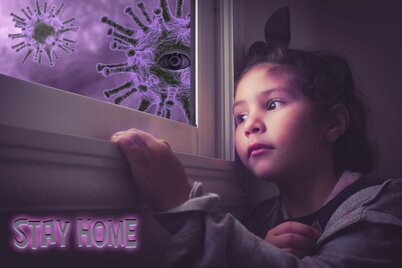BY ANGELA M. WISEMAN On April 21 I wrote a post on the same topic, in which I addressed some of the anxiety, stress, and trauma that children might be facing during COVID-19. In this follow-up post, I am sharing some books that my colleagues and I have found helpful in talking with adults and children about trauma, in hopes that these books can start facilitating conversations about feelings, fears, hopes, and dreams.  COVID-19 has created stressful situations for many families - we may be concerned about many issues, including financial issues/job security, trying to meet professional obligations, and staying healthy. Children are experiencing general anxiety and stress, but also often experience negative feelings resulting from missing friends and family, adapting to changes in routines and activities, and fear of getting sick. In this post, I am going to suggest some ways to use children’s literature to start conversations about anxieties, sadness, and coping mechanisms. In addition, I share some resources for adults and children that might be helpful. Books for talking about anxieties and fear
Reading and responding to literature can be emotional, empowering, and transformative. When children experience trauma or anxiety, picturebooks can be a powerful way to foster conversations about their experiences and beliefs. Or, simply, they can offer an opportunity for adults and children to talk about feelings and emotions. The complexity of picturebooks - the visual and textual components - allows for multiple ways to respond and consider topics. Children’s literature can expand readers’ experiences; encouraging readers to relate to others and consider different perspectives. In addition to text, images serve as a central component of picturebooks that allow readers to articulate insightful interpretations that can lead to further discussion.
Here are two books that could cultivate conversations about anxiety and stress. I have used both of these texts with my colleagues in a trauma-informed family literacy program for parents who are in rehabilitation for substance use disorder to foster communication and build relationships. After describing the two books that could facilitate discussions, I provide some suggested ebooks about the CoronaVirus. Finally, I provide a few resources that could be helpful for families.
Thank you to Lauren Liang for suggesting the ebooks. I would like to acknowledge Qiana Cryer-Coupet’s and Ashley Atkinson’s collaboration on the family literacy program and Qiana’s contribution of additional helpful resources. Image by enriquelopezgarre. Pixabay License.
Comments are closed.
|
Authors:
|
CLA
About CLA
|
Journal of Children's Literature
Write for JCL
|
ResourcesCLA-sponsored NCTE Position Statements
|
Members-Only Content
CLA Video Library
|
© COPYRIGHT 2018.
ALL RIGHTS RESERVED |

 RSS Feed
RSS Feed